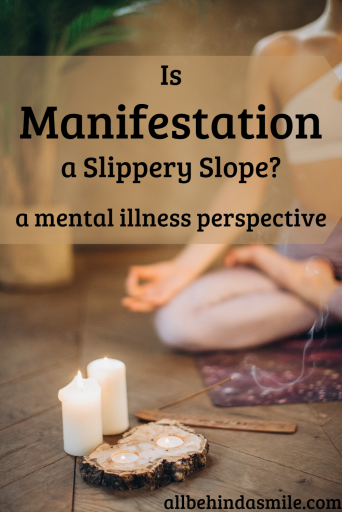It’s all the rage everywhere you look – manifestation of a better future, a better life, a better _ (fill in the blank). But is it really the promise it looks like, or just another slippery slope?

Although initially I had considered tackling this topic from a more religious standpoint, taking into account the WHY of All Behind A Smile, today we are (primarily) approaching from a mental illness perspective.
Manifestation: Promising or Slippery Slope?
If everything truly were black and white we would have our answer already, but of course the world we live in doesn’t work that way.. especially when you take mental illness into account.
There are aspects to manifestation that seem promising; although, this list would differ according to other beliefs taken into consideration as well.
Some of the more promising aspects have to do with how you think about what comes your way. Although I’m not defining manifestation here; it’s been done many times before – part of the process takes into account your beliefs. Your beliefs about the how and why of what has and is happening, and how it will impact your present self and future.
Even from a (very cautious) standpoint, your beliefs (moderated by the universe or not) can have a drastic impact on your life. Even without any form or belief in manifestation, how you BELIEVE or think can (and likely will) impact how you react.. which most definitely transforms the whole outcome of most situations.
Just consider for a moment.. if you believe no harm was intended, and react with that belief, then the outcome is more likely to be positive whether physically or mentally.
HOWEVER, if you believe harm WAS intended (regardless of actual intent), and react with THAT belief, the outcome is more likely to be negative – even if you don’t outright say or do anything despite your belief, your mind is a holding place for angry or toxic thoughts, and how you think has a big impact.
Unfortunately, from a mental illness perspective, that is where the positives for manifestation end.
The Slippery Slope
Although one could argue that regardless of manifestation being a true phenomenon, it gives those with mental illness additional hope to cling to, I would not even agree with that perspective.
Manifestation (to my current knowledge) cannot be measured or proven, therefore it cannot be consider fact, and yet it cannot be discounted, either. With that being said, people with mental illness (especially) need more than a false hope to cling to.
While changing their beliefs about a situation can and likely will improve their lives and outlook (affirmations, anyone?), there are other ways (aforementioned) to go about gaining that improvement without the addition of false hope.
Although there is nothing inherently wrong with belief in manifestation, every time something goes wrong it leaves you with the impression that there is something wrong with you or the way your are living/thinking/handling the situation/_ (fill in the blank). Always looking for answers, so to speak, because although things might go well for awhile, it’s simply part of life (and growth and learning) for situations to not always go in our favor.
Psst! Check out Taking Back the Power from Failure if you are struggling when situations don’t necessarily go your way.
There is so much more that could (and likely will) be written about this topic, but for now there’s enough depth to marinate on. Each person must decide, is manifestation for me? Or is it a slippery slope of false hope? If you have taken a side, which have you chosen? Let me know in the comments below.

Christian, wife, “hybrid” mama, I run the site All Behind A Smile to help others like me.


[…] read what potential risks lurk there (especially for those of us with a mental illness) over at Is Manifestation a Slippery Slope? But. I […]